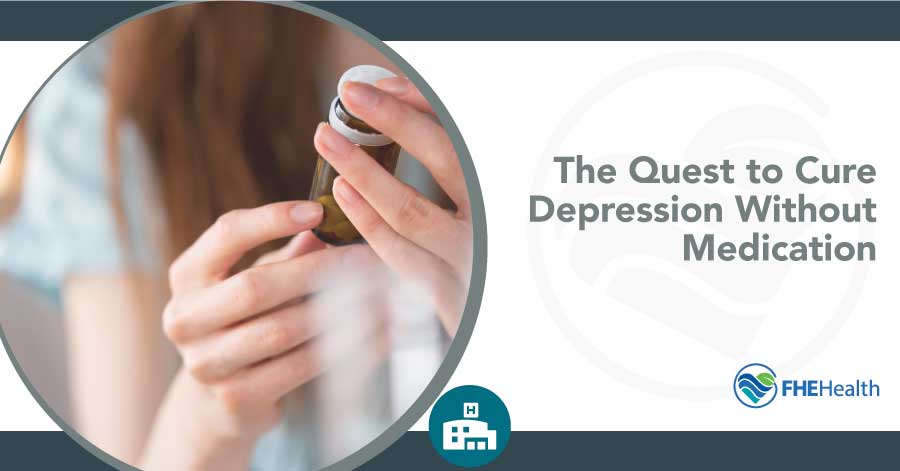
For many, seeking treatment for depression without medication is the ideal option. Medications may be necessary for some people, but not all people need them or want to use them. Many people can see improvement by learning how to naturally improve mental health and physical wellbeing. While it is always best to receive a full evaluation from a medical provider, it’s worth exploring ways to treat depression without the use of medications. In fact, even if you do choose to use medication, you may require a lesser daily dose because you’re able to help manage your symptoms with natural remedies.
Who Is Affected by Depression?
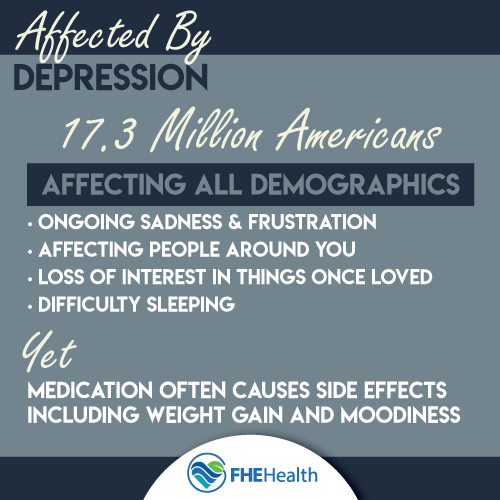 Depression is a common medical health disorder affecting 17.3 million people, according to the National Institute on Mental Health. It can impact teens, adults, and seniors and occurs in all demographics. Depression creates numerous complications in daily life.
Depression is a common medical health disorder affecting 17.3 million people, according to the National Institute on Mental Health. It can impact teens, adults, and seniors and occurs in all demographics. Depression creates numerous complications in daily life.
Symptoms such as ongoing sadness and frustration, along with the impact that the disease has on the people around you, may push you to find a treatment option. Depression causes a loss of interest in things you once loved and makes it hard to sleep or get up in the morning. At the same time, many people don’t want to deal with medications.
Some medications can cause side effects, such as changes in weight, moodiness and health complications, or reduced sex drive. Some people say they just do not feel like themselves. Others struggle with a lack of focus, lethargy and poor energy levels. For some, having to manage these types of side effects just doesn’t seem to be worth it. Also, after people are able to get their depression under control with the use of medication, they may be able to transition to a regimen of natural therapies for mental health maintenance without the need for further antidepressant use.
Other people want help for depression but don’t want to speak to a counselor about their concerns. In this case, they may search for a way to deal with major depression without medication. This is rarely a good thing, though. Even if you choose not to speak with a trained psychologist or psychiatrist, your primary care doctor will be able to advise you and will certainly want to be apprised of your progress with natural remedies. While non-medication therapies may work for some, they may not work for you or work well for you. At this time, your depression may be too deep and you might require medical intervention.
Reasons to Look for Natural Remedies for Depression
It’s always beneficial to incorporate a wide range of natural remedies into your life that boost mental well-being and overall physical health. Many of these can help you to work through minor depressive periods. Many people who suffer from depression and other mental health conditions look for natural solutions that enhance both their mental and overall health. These might include:
Yoga and Meditation
Yoga is an ancient practice that took root in the East but has become a commonplace practice in Western countries today. Yoga features a strong focus on physical movement like stretching and, as a form of exercise, benefits both the mind and body. Exercise triggers the release of feel-good endorphins that soothe both muscles and symptoms of mental stress, including the alleviation of symptoms of anxiety or depression.
During yoga sessions, there is also a strong focus on meditation and mindfulness. Practitioners strive to clear their mind and focus exclusively on their stretches and breathing. This practice can have a highly therapeutic effect on the mind. Although not a cure for depression, it can alleviate symptoms, providing the individual with relief so that when they do return to their regular routine after departing from their yoga class or session, they feel better able to cope or manage their symptoms.
Supplements
Natural remedies exist in the form of supplements, too. There are many natural supplements that feature ingredients such as valerian root or St. John’s Wort that have long been used to help reduce symptoms of depression. The use of these natural plants dates to the ancient Roman period at least. Even prehistoric peoples relied on herbs to alleviate symptoms associated with physical and mental health ailments.
If you are considering using a supplement, it’s important to consult your healthcare provider. You may be taking other medications that might counter interact with your supplement. It’s always advisable to talk to your doctor before embarking on any type of supplement routine.
Some people may benefit from simply talking to a friend and engaging in a full heart-to-heart conversation in order to find relief from their symptoms of depression. Others benefit from seeking out more time in nature or equine therapy.
The key here is to recognize that these types of natural remedies can help you cope with depression. They don’t cure it. In some situations, though, they can help you to start feeling better so you can get through the day.
A Better Option: Integrating Medical Care with Natural Remedies
Did you know that many who receive counseling and treatment for depression do not use medications as a component of their treatment plan? Many people work with their medical providers one-on-one trying several approaches with the goal of improving their mental health without the use of chemical-based medications. It’s possible to manage your mental health care with this goal if you consider a few key things.
A Full Assessment Is the Starting Point
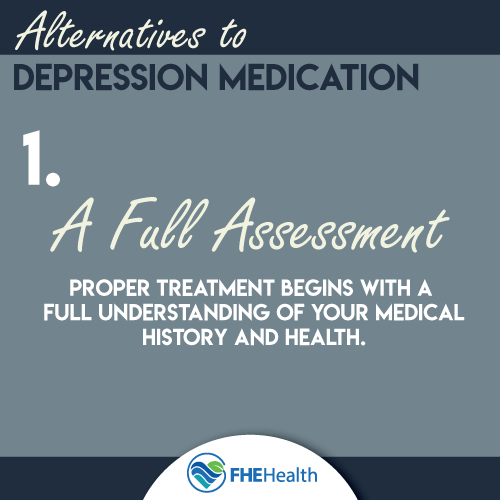 To learn what you personally need, it’s critical to have a full assessment completed by a trained and licensed counselor or psychiatrist. The goal here is to evaluate why you are experiencing the thought patterns and ways that you feel.
To learn what you personally need, it’s critical to have a full assessment completed by a trained and licensed counselor or psychiatrist. The goal here is to evaluate why you are experiencing the thought patterns and ways that you feel.
Some men and women have a chemical imbalance, which could be due to a hormonal imbalance. In other cases, it is due to changes in the brain’s structure and its ability to communicate. In some people, medication is necessary, but a full assessment is needed to determine this. It is never considered the first treatment option.
Working Through the Cause
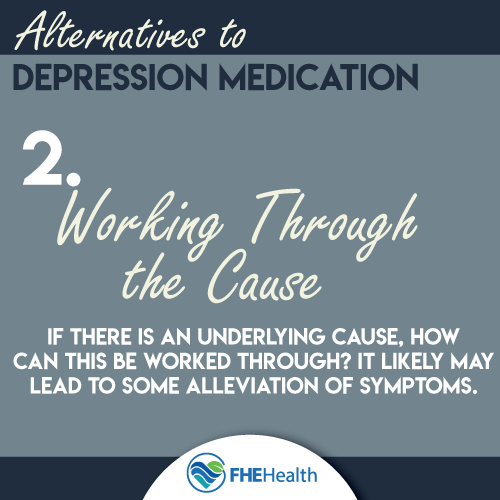 One component of the process is to work through the underlying cause. In some situations, this means using treatments like cognitive behavioral therapy, which helps you learn how to spot the negative thought patterns that derail your day. You also learn how to change them to limit the amount of time you are focused on the negative.
One component of the process is to work through the underlying cause. In some situations, this means using treatments like cognitive behavioral therapy, which helps you learn how to spot the negative thought patterns that derail your day. You also learn how to change them to limit the amount of time you are focused on the negative.
It’s also important to assess you for any type of substance dependency, trauma or other aspect of your life that could be contributing to your depressive symptoms. For instance, it’s not uncommon for people who abuse alcohol or drugs to develop a mental health condition like depression. Your therapist performs this assessment in confidentiality and only to the level with which you are comfortable. An evaluation is important because it allows your caregivers to recommend the ideal course of treatment for you.
Incorporating Natural Treatments
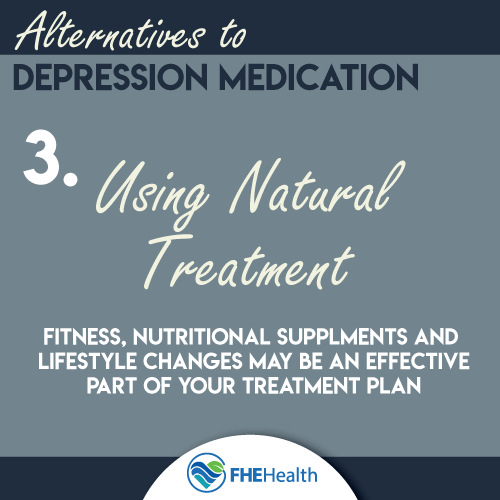 You’ll work with your counseling team next to create a treatment plan for depression that focuses on your body’s physical needs and mental health concerns. This may include treatments to address vitamin deficiencies, fitness, and nutrition focus. Sometimes there are underlying physical conditions that can cause depression due to pain.
You’ll work with your counseling team next to create a treatment plan for depression that focuses on your body’s physical needs and mental health concerns. This may include treatments to address vitamin deficiencies, fitness, and nutrition focus. Sometimes there are underlying physical conditions that can cause depression due to pain.
Other components of your treatment may include group and individual talk sessions. Massage treatment works to stimulate a natural healing impact for many. Some people benefit from incorporating acupuncture into their treatment plan. Fortunately, today, there are many new approaches for the treatment of depression. It’s not uncommon to find that one form of therapy works better for you than another.
Your team works closely with you to create this type of plan based on your physical and mental needs. A number of other treatment options are available, too, including neurorehabilitation and brain stimulation therapy.
When Medication Is Beneficial, It’s Approached Properly
There are situations in which the use of medication is warranted. When you need it, it’s important to work closely with your therapist to understand the right type of depression medication for your needs. The key here is that there are numerous products available today to help you. However, one medication may not work as well as others.
You may have experienced a time when a depression medication didn’t work well or made you feel numb to the world. That’s not normal, and you should work with your therapist to find a better solution. It may be necessary to compare several options to find one that’s best for your needs.
Medications for depression have come a long way. Not only are many of these medications effective at what they’re meant to do–reduce depression-related symptoms–but they also are known to cause fewer side effects than medications of the past used to treat this condition.
What Is a Medication That Works Well for You Supposed to Feel Like?
It’s quite common for people taking an antidepressant to not feel like themselves. This type of drug works to balance the chemicals in your brain that are not communicating properly with each other. Balancing these chemicals, called neurotransmitters, can reverse some of the negative feelings you have. This can help improve your mood and help you sleep.
If you don’t feel “right,” though, you may need another medication as well. There are other solutions doctors can offer that can work alongside your antidepressant to improve your overall wellbeing. Sometimes one drug will stop working effectively over a period of time. This doesn’t mean other drugs won’t help you, though.
When the right combination occurs, you should feel comfortable. You should feel like yourself but perhaps a bit more focused. You should no longer experience depressive thought patterns, especially those about suicide or feeling unwanted. You may feel more like rebuilding relationships and enjoying things you used to do.
The combination of taking medications and integrating natural remedies into your treatment plan for depression should result in feeling better equipped to face the day. You should be able to feel happiness again. If not, you may still need to work with your doctor to find the right treatment solutions.
Getting Treatment for Depression at FHE Health
FHE Health offers a wide range of treatment options to support both non-medication and medication-based therapy for depression. Call our team today to discuss the way you feel and allow us to create a customized treatment plan for you.






